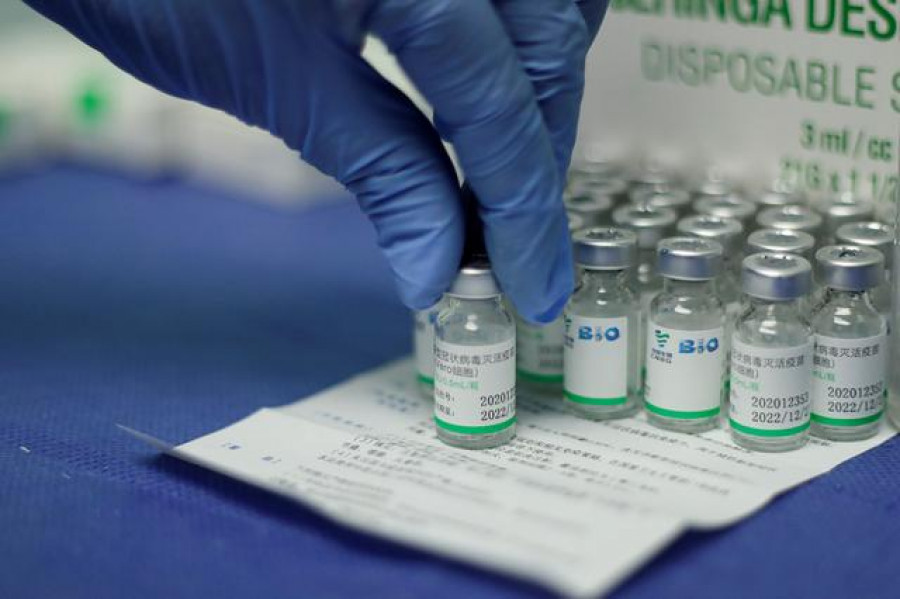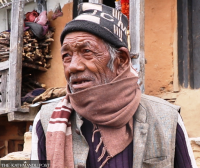National
Red tape, indecision and politics blamed for delay in getting Chinese vaccines
Initially there was over-dependence on India and when the crisis deepened, authorities scrambled to acquire shots but made little effort to reach out to Beijing, officials say.
Anil Giri
Nepal’s vaccine procurement conundrum has continued even as coronavirus cases surge, with no immediate information on when the country will be able to acquire enough jabs to inoculate 72 percent of its 30 million population.
No information is forthcoming also when those 1.3 million people who have taken the first shots of Covishield, the AstraZeneca type vaccine manufactured by the Serum Institute of India, will get their second dose.
Multiple officials the Post spoke to could only say that work to get vaccines is ongoing on a war footing. But they were unable to answer when the vaccines will arrive in Nepal.
With the Serum Institute of India, the world’s largest vaccine producer, now putting out a public statement that it would be able to export the jabs only by the end of this year, questions are now being asked why Nepal did not explore other vaccine-producing countries and companies, including China, and relied totally on India.
As COVAX itself is also under pressure now, there seems little prospect of getting vaccines from the United Nations-backed facility that committed to providing around 13 million jabs for free to Nepal.
Amid this, officials at the Ministry of Foreign Affairs and the Health Ministry, however, pointed at each other for not doing enough to acquire vaccines on time.
An official at the Foreign Ministry said the Health Ministry has been sitting on a proposal for over a week. The proposal was sent by the Nepali embassy in Beijing on procuring Sinopharm’s BBIBP-CorV.
“The Nepali embassy in Beijing made a correspondence to the Ministry of Health through the Ministry of Foreign Affairs about the details regarding the vaccine, including the price, logistical issues and estimated time of consignment arrival to Nepal,” said a joint secretary at the Foreign Ministry who wished to remain anonymous. “But we have not received any feedback and response from the Health Ministry.”
According to the official, the correspondence followed a visit about two weeks ago to the headquarters of Sinopharm by Mahendra Bahadur Pandey, Nepal’s ambassador to China, and Sushil Kumar Lamsal, the deputy chief of mission.
The Post’s repeated attempts to reach out to Lamsal for comments on the current vaccine procurement status went unanswered.
The Nepali embassy took the initiative as per a request by Nepal to the Chinese government a little over a month ago, seeking two million doses of BBIBP-CorV developed by Sinopharm, according to the Foreign Ministry official.
Dr Roshan Pokhrel, chief specialist at the Health Ministry, however, said the ministry had asked the Foreign Ministry to initiate a process to procure vaccines whenever and from wherever they can be procured.
“The Health Ministry is ready to procure vaccines under a government-to government-model and ready to pay the international market price,” Pokhrel told the Post. “The Health Ministry has also asked the Foreign Ministry to help negotiate directly with the manufacturers.”
Questions, however, remain if both the ministries were ready to work in tandem, what exactly caused the delay.
In Nepal, with the virus crisis deepening by the day, people are now writing petitions to countries like the United States and the United Kingdom to provide vaccines, oxygen and other medical supplies.
A group of civil society members a few days ago issued a statement addressing the Chinese ambassador in Nepal to provide additional vaccines.
Earlier this year, Nepal’s both neighbours had come forward to extend support in the fight against the pandemic by providing various medical supplies. After India sent 1 million doses of Covishield under grant assistance on January 21, 800,000 doses of Sinopharm vaccine that China had pledged arrived in Nepal on March 29.
Of the 2 million doses for which Nepal paid the Serum Institute, 1 million doses arrived in Nepal on February 21. Thereafter, Nepal received 348,000 doses of Covishield from COVAX on March 7.
“We knew since the very beginning that the Covid-19 vaccine is a strategic product and that rich countries will rush to hoard it. It would be wrong to say that no efforts were made to secure the vaccines,” said a secretary at the Prime Minister’s Office who also spoke on condition of anonymity fearing retribution. “I cannot say why there was inaction from the top political leadership.”
A section in the bureaucratic and political circles believes that some geopolitical reasons were behind it.
“It is true that Prime Minister Oli did not want to antagonise India by procuring Chinese vaccines when the options were open from the southern neighbour,” a ruling party leader said on a condition of anonymity. “But it would be wrong to say that was the only reason for the delay, as we understand.”
That the Serum Institute won’t be able to supply additional doses to Nepal had become clear in early March. In a letter to the Department of Health Services dated March 3, the Serum Institute had made it clear about its inability to deliver the remaining consignment citing force majeure.
The government, however, never made it public and kept on telling the public that the vaccines from India would arrive soon. When the crisis deepened, Health Minister Hriyadesh Tripathi went out to the media saying some agents blocked vaccine procurement from India. In the third week of March, India put a hold on the export of AstraZeneca vaccines, citing rising demands at home in the wake of surging coronavirus cases.
That should have set off alarm bells among the Nepali authorities, and many believe it was time Nepal turned to the north and made an aggressive effort to acquire vaccines. But officials say there was no initiative to secure vaccines from China.
Over the past few months, Foreign Minister Pradeep Gyawali has held several rounds of talks with his Chinese counterpart Wang Yi, one-on-one as well as in a common conference with foreign ministers from South Asian countries, save India, Bhutan and the Maldives, on April 27.
During the conversation, according to the Chinese Foreign Ministry, talks were held on a wide-range of issues, with Beijing showing its willingness to work on vaccine cooperation as well.
But officials say no concrete initiative was taken from the Nepal side on securing vaccines from the northern neighbour.
Officials say there were also concerns about the Chinese vaccine initially, as it had not been listed by the World Health Organisation for emergency use. Despite China promising to provide vaccines in grants in January, Nepal took months to send a plane to bring them.
“It took two months for us to take a decision on accepting the Chinese vaccine that came under grant assistance,” an official said.
Though Nepal had granted emergency use authorisation to the Sinopharm vaccine in the second week of February, the UN health agency listed it for emergency use only on May 7.
Multiple officials the Post talked to admitted that there was initially over-dependence on India for the vaccines and after prospects of acquiring vaccines from Russia also faded, Nepal finally looked to the north.
No one provided a clear answer as to why the Nepal government took so long to request China for vaccines.
In a brief telephone interview with the Post, Foreign Minister Pradeep Gyawali blamed bureaucratic issues for failing to procure vaccines from China.
“Some of the provisions in the Public Procurement Act also caused the delay in taking decisions,” said Gyawali. “We need to remove obstacles in our procurement law also, as existing provisions and bureaucratic framework make it difficult to import emergency items during an emergency.”
Gyawali hoped that the modalities for procurement would be finalised by the end of May.
After the correspondence from Beijing, according to Health Ministry officials, internal discussions took place on modalities of vaccine procurement.
Since the ministry leadership had already landed in controversy in the past during vaccine procurement from India, they wanted to be more careful, one senior official said.
“Either we have to go for a government-to-government deal or a government-to-manufacturer deal or a business-to-business deal,” the official told the Post. “After completing internal discussions, we have already made a correspondence to the Foreign Ministry to take up the matter with China so that we can reach a deal at the earliest.”
According to the official, it must be made clear first whether China would prefer a government-to-manufacturer or a government-to-government deal.
The Foreign Ministry, however, said its job is just to facilitate the procurement process at the diplomatic level.
“The Health Ministry is not taking any decision on proposals from China as well as Russia,” said the joint secretary at the Foreign Ministry who did not wish to be named. “The Chinese side has offered the vaccine rate per dose. Since this is a non-disclosure agreement, I am unable to share the proposed price to the media. What I can say is there is still room for negotiations.”




 13.12°C Kathmandu
13.12°C Kathmandu













